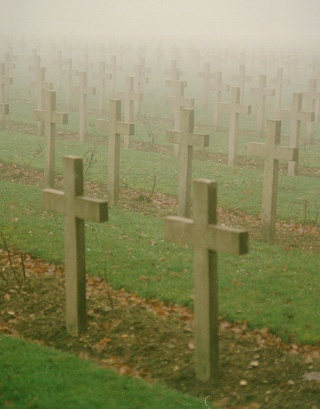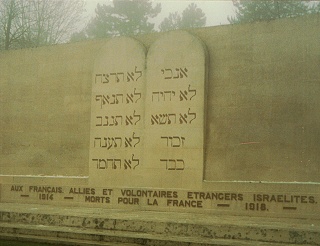The Saddest Place
The battle of Verdun
was among the most horrifying of all the many terrible battles of the
First World War. This happened by design: the German commander, General
Erich von Falkenhayn, had concluded that the only way to win the war was
to "bleed France white." He had more soldats than the French had poilus, so if the armies settled down to serious tit-for-tat killing,
the last man standing would be wearing feldgrau.
Falkenhayn chose the
stage for his devilish scheme well. The ancient city of Verdun held great
importance to French national honor: a mere thirty miles from the German
border, the site had been a citadel since Roman times. In 878, Charlemagne's
sons met here to sign a treaty that would divide his empire into the lands
that would eventually become France and Germany. To lose the historic
city was unthinkable to the French, Falkenhayn knew; they would indeed
defend Verdun to the last drop of their blood.
There is a cemetery
at a place called Douaumont where a small fraction of the men killed in
this battle are buried. Just a small fraction… maybe only a hundred thousand
or so. It is a tremendously impressive place- row upon row upon row of
crosses marking the graves of the victims.
The day I visited
Douaumont was foggy, and the fog was so dense that one could not see to
the far side of the cemetery. The result was that it seemed as if the
rows of crosses continued into infinity. It was eerie.

As this bleak mood
settled over me, I turned and noticed a large memorial at one corner of
the cemetery. It was shaped in the form of Biblical tablets, and it was
covered with Hebrew letters. I realized what it was- a memorial to the
soldiers who could not be buried under crosses- a memorial to the Jewish
soldiers who died for France.
And then I was overwhelmed
with grief and came as close to tears as I did on that trip. I thought
of those young men who fought and died, never knowing that in 30 years
their widows and their children would be herded into boxcars and
exterminated like vermin. The futility of the sacrifice of these Jewish
soldiers was too much to contemplate. It made me clearly understand the
greatest tragedy of World War One was that after so many men had given their
lives, it was not enough.
The politicians would
let it all happen again, and the sons of these dead soldiers would be
at war once more.

"Died
For France: 1914-1918 |